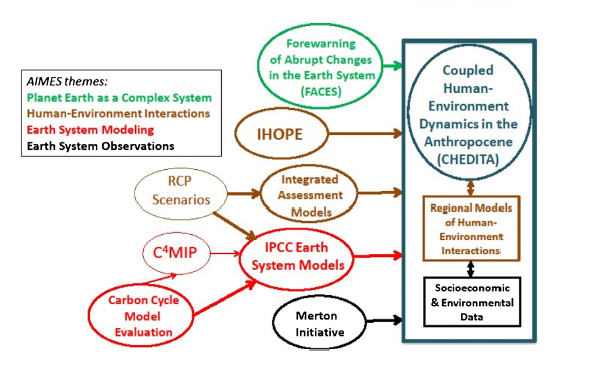Tracking humanity: The new key to forecasting global change

Humankind may still prove to be the planet's best friend or its worst enemy, advise global earth science leaders at Arizona State University. But those in this field can no longer limit their studies to the recent past and present times, they say, nor view modern humans as outside agents convoluting a more natural order.
By now, "the natural and the human-made are meshed together in a cyborg whole," explains Sander van der Leeuw, foundation professor at ASU's School of Human Evolution and Social Change (SHESC) as well as the ASU School of Sustainability.
For he and fellow SHESC professor Michael Barton, this means that earth science systems must also evolve, taking into account not just data from fields such as geology, meteorology, oceanography and astronomy, but also from economics, governance and other distinctly human social dimensions that can reshape the planet just as dramatically.
"Whenever any change occurs, man-made or natural, for better or worse, it alters in real time what options exist and what approaches will steer us toward positive futures," says van der Leeuw. "But the social scientists and nature scientists looking for those changes on their own sides of the aisle rarely have access to the same culture, tools or trade languages."
To that effect, van der Leeuw and Barton have traveled the globe under the United Nation's Future Earth program in order to develop a multi-year science plan bridging these once-distinct fields of study. This includes establishing shared computational software, development and implementation standards, and even common research agendas.
Their goal is not to minimize or homogenize away pure, traditional earth science, such as the historic Global Analysis Integration and Modeling (GAIM) effort, which measures the impact of carbon cycles, or the original AIMES 1.0 methodology for tracking physical and biological changes in land and ocean systems. Both models worked so well that they became scientific standards still used in Intergovernmental Panel on Climate Change (IPCC) Assessment Reports.
But van der Leeuw and Barton, leading international teams along with Peter Cox at Exeter University, are focusing on overlaying a new methodology that will expand the field's understanding of these naturally-existing complex adaptive systems with human networks that are also subject to societal changes, such as in demography, the internet and the global economy. It's being referred to as AIMES 2.0.
This push is in tandem with many ongoing efforts such as the IHOPE project, which uses real archeological and paleo-environmental models of change, and applies them to modern settings on a long-term trajectory.
Like a data-driven version of The Sims, AIMES 2.0 researchers work on how to keep the "game" going and its characters (us) alive and thriving for as long as possible, despite constant variables such as trade interruption, drought, population boom, and regime change.
This approach is already gaining global momentum and adoption as part of Future Earth and The World in 2050, a project that is supported by funds from NASA (through Columbia University), the Stockholm Resilience Center, and the International Institute for Applied Systems Analysis in Vienna.
"The undercurrent you see in all of these efforts is a move from explaining and learning from the past, to anticipating and learning for the future," says van der Leeuw. "We'll be monitoring cities and other densely-populated, accessible areas as possible tipping points, but also our tropics, high altitude, and blue-water regions, and the points where they all intersect. It all matters in a truly global earth science system."
Provided by Arizona State University














